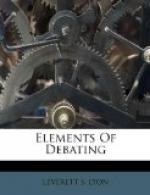The Honor System should be established in the Greenburg High School, for:
I. The student will do honest work under that system, for:
1. Experience of similar schools shows this, for:
(1) This plan was a success in X High School, for:
a) The principal
of that school states [quotation from
principal],
for:
(a) See School Review, Mar., 1900.
(2) This plan is approved by Y High School, for:
a) Etc.
Here the statements used in support of the issue are evidence. If the evidence is strong enough to bring conviction to the audience to which you are speaking, it is proof.
But notice here an important point. Why should this tend to make those in the audience believe that the honor system should be adopted? Simply because we have shown them that it has worked well elsewhere, and their own experience tells them that what has been a benefit in other schools similar to this will be a benefit here.
And in its final analysis this evidence is no stronger than the words of the men who state that it has worked in schools (X) and (Y).
If the experience of the audience is that these men are untruthful or likely to exaggerate, our evidence will not be good evidence. If the experience of the audience is that these men are capable, honest, and reliable, this evidence will go far toward gaining acceptance of, and belief in, our proposition.
Many attempts have been made to put evidence into different classes and to give tests of good evidence. There is but one rule that the debater needs to use: In judging evidence for a debate consider what the effect will be on the audience and the judges. Will it be convincing to them? In other words, will it make their own experience quickly and strongly support the issues?
Time is always limited in a debate. The wise debater will then choose that evidence which will most quickly make his hearers feel that their own experience proves him right. When the speaker has done this, he has chosen the best evidence and has used enough of it.
In courts of law where witnesses appear in every case and testify as to circumstances that did or did not occur, it is necessary that the jury be able to distinguish carefully between what it should and should not believe. Witnesses often have a keen personal interest in the verdict and, therefore, are inclined to tell less or more than the truth. Sometimes witnesses are relatives of persons who would suffer if the case were decided against them and they have a tendency to give unfair testimony.




